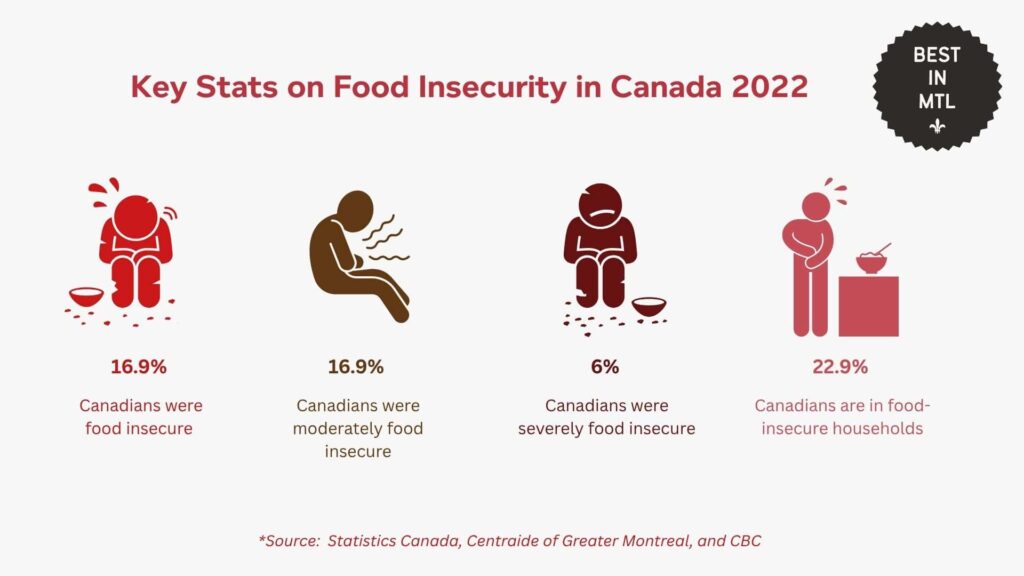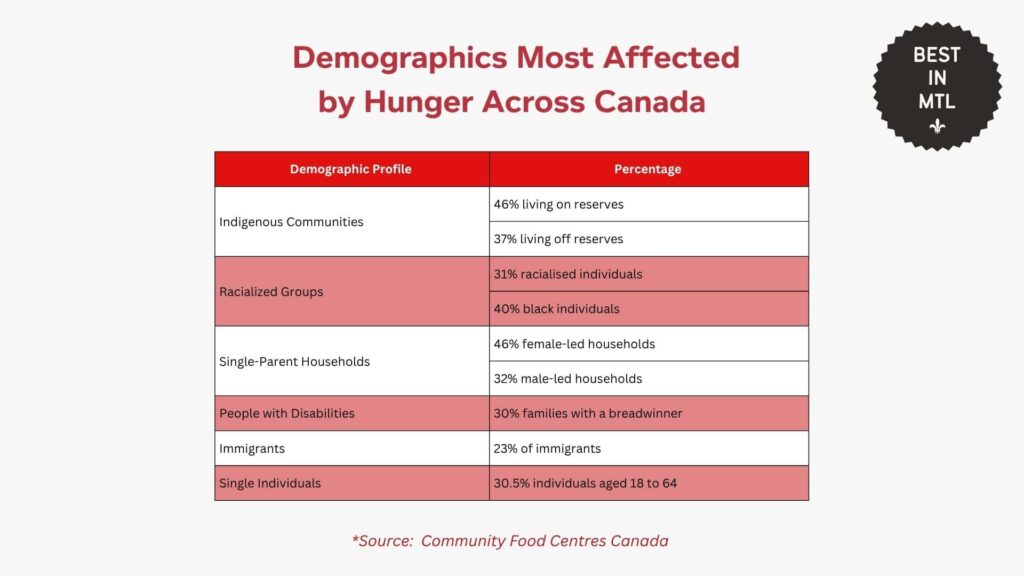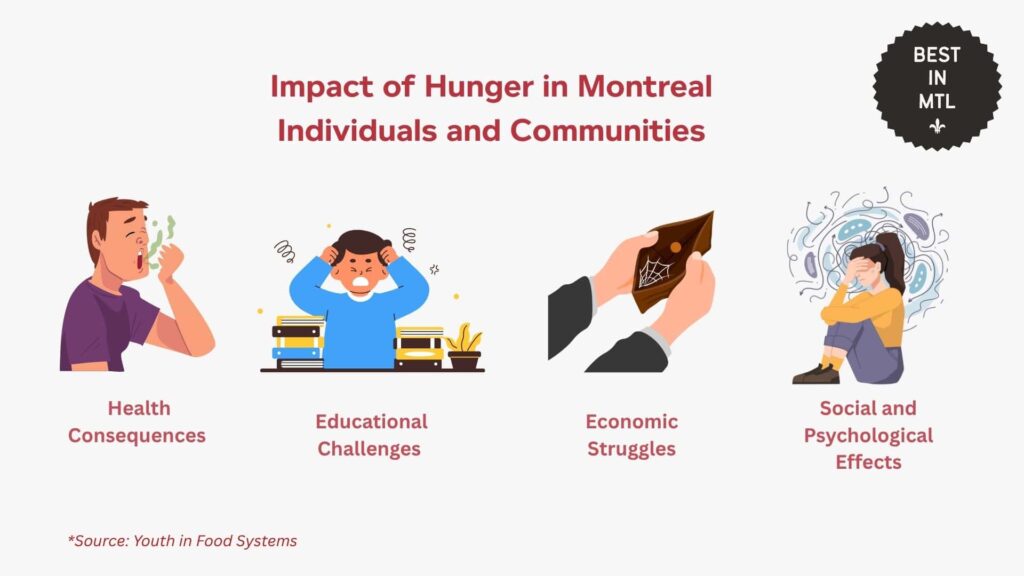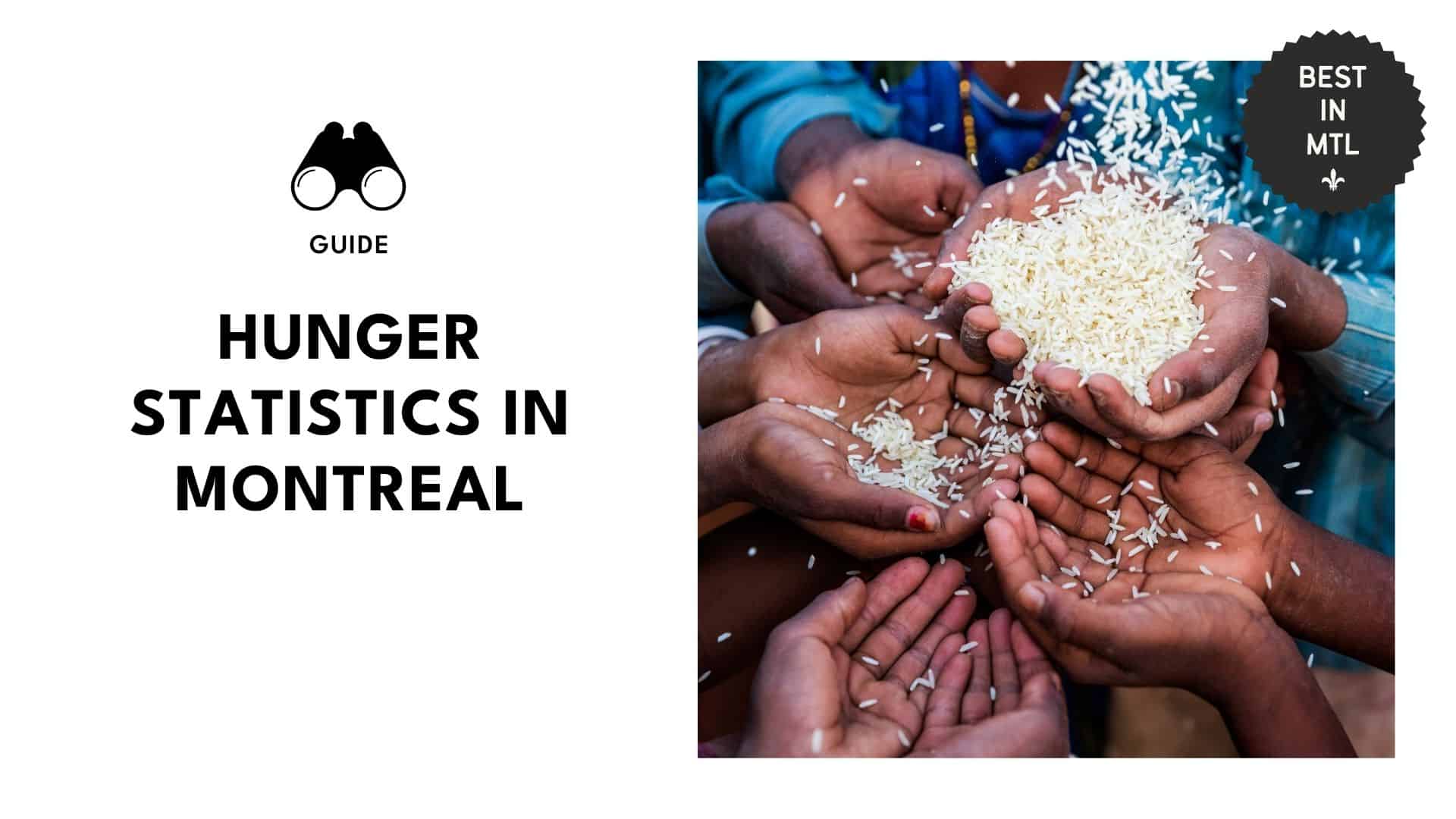Understanding hunger in Montreal: Statistics, causes, and solutions
- Key Insights
- Current hunger and food insecurity statistics in Montreal
- Causes of hunger and food insecurity in Montreal
- Demographics affected by hunger in Montreal
- Impact of hunger in Montreal communities
- Government and policy responses to hunger in Montreal
- Public awareness and advocacy for hunger in Montreal
- References
Key Insights
| According to Statistics Canada, food insecurity in Canada rose from 12.9% in 2021 to 16.9% in 2022. This marks a 5.3 percentage point increase since 2018. According to Community Food Centres Canada, food insecurity disproportionately affects marginalised groups: 46% of indigenous people on reserves, 40% of black individuals, 46% of female-led single-parent families, and 30.5% of single adults aged 18 to 64. As per the Foundation of Greater Montreal, the Zero Hunger project in Montreal laid the groundwork for lasting change by mapping the food system. This has led to increased funding and initiatives such as Montreal in Common and the 2022 SAT Forum. |
Food insecurity continues to rise across Canada, with Montreal as no exception. According to Statistics Canada, 16.9% of Canadians were food insecure in 2022. This marks an increase from 12.9% in 2021.
Between 2018 and 2022, the rate of food insecurity increased by 5.3%. This data highlights that the issue is not only persistent but also worsening over time.
Current hunger and food insecurity statistics in Montreal

On a city level, Montreal has been facing similar problems in food insecurity.
According to Centraide of Greater Montreal, food insecurity has long been a persistent issue in the region. The COVID-19 pandemic further intensified this issue, affecting approximately 200,000 people who were already suffering from a lack of food.
During the lockdown, 28% of adults in Greater Montreal reported having difficulty getting food.
As food insecurity in Canada reached alarming levels in 2022, nearly 8.7 million people (22.9% of the population) lived in food-insecure households, according to CBC. This marks a sharp increase, growing from 18.4% in the previous year.
The same data also showed that 10.9% of Canadians were moderately food insecure, while 6% were severely food insecure.
Causes of hunger and food insecurity in Montreal

Hunger and food insecurity in Montreal are not simply a result of individual choices. According to Food Banks Canada, these issues are connected to broader social and economic challenges, namely:
- Financial Challenges: Over half of Canadians are just one paycheque away from serious financial difficulty.
- Health Crises: A sudden illness or accident can lead to loss of income and increased medical expenses.
- Employment Instability: Job loss or unstable work can quickly result in an inability to afford groceries.
- Unsafe Living Conditions: Domestic violence or unsafe family situations may force individuals to leave their homes and financial security behind.
Demographics affected by hunger in Montreal

Looking beyond Montreal, food insecurity across Canada does not impact all communities equally. According to Community Food Centres Canada, certain demographic groups face significantly higher rates of food insecurity.
These rates usually suggest systemic inequalities, social barriers, and economic disadvantages.
- Indigenous Communities: Indigenous communities are among the most affected. The data shows that 46% of indigenous people living on reserves and 37% of those living off reserves experience food insecurity.
- Racialised Groups: Racialised groups also experience food insecurity at high rates. In particular, 40% of Black individuals and 31% of racialised individuals experienced overall food insecurity.
- Single-Parent Households: Single-parent households, especially female-led ones, are another group highly affected. Nearly half (46%) of female one-parent families experience food insecurity. On the other hand, 32% of male-led one-parent families are also affected.
- People with Disabilities. Individuals with disabilities, particularly 30% of families with a breadwinner who has a disability, experience food insecurity.
- Immigrants: 23% of immigrants report food insecurity, likely due to barriers to stable employment and accessible services.
- Single Individuals: Single individuals aged 18 to 64 are heavily affected, with 30.5% experiencing food insecurity. This group may lack social support networks and face high living expenses on a single income.
Impact of hunger in Montreal communities

The consequences of food insecurity are multifaceted, affecting various aspects of daily life, not only for those who live in Montreal but also for those who are affected across Canada.
According to Youth in Food Systems, some of the most significant impacts include the following:
- Health Consequences: Insufficient access to nutritious food often leads to malnutrition, particularly in children and vulnerable populations. This can result in stunted growth and increased susceptibility to diseases.
- Educational Challenges: Food insecurity directly affects children’s ability to grow academically, as hunger and malnutrition can impede cognitive development and concentration.
- Economic Struggles: Food insecurity contributes to a cycle of poverty, making it harder for individuals to escape financial hardship.
- Social and Psychological Effects: Individuals and families often experience chronic anxiety, fear, and uncertainty about where their next meal will come from.
Government and policy responses to hunger in Montreal

In recent years, efforts to address hunger and food insecurity in Montreal have evolved into collaborative policy initiatives. One notable example is the Zero Hunger in Montreal project.
According to the Foundation of Greater Montreal, the foundation launched this project in collaboration with Collectif Récolte from 2018 to 2020.
This project aimed to strengthen Montreal’s food security through detailed research, mapping of the supply system, and collective mobilisation.
The impact of the Zero Hunger project continues to resonate beyond its conclusion. According to a 2022 review, the initiative contributed to increased funding for food security-related actions.
Building on this foundation, other initiatives have emerged. For instance, the food component of Montreal in Common marks a step towards innovation in the food system.
On the collective action front, an important milestone occurred in late 2022 with the first-ever Forum on Territorial Food Systems (SAT Forum).
This brought together 400 representatives from across Quebec, including indigenous communities, calling for stronger networks to develop shared solutions. This forum marked a turning point in how regions in Quebec approached food insecurity.
Public awareness and advocacy for hunger in Montreal
Various organisations help raise public awareness to combat hunger and food insecurity in Montreal.
Food Banks Canada
Food Banks Canada helps raise public awareness about hunger and food insecurity, aiming to eliminate the need for food banks altogether.
Through its extensive network of over 5,500 food banks and community organisations, Food Banks play a role in ending hunger. They provide immediate relief and prevent hunger in the long term.
Action Against Hunger
Action Against Hunger is a global humanitarian organisation that addresses both the causes and effects of hunger. With over 40 years of experience, the organisation has provided long-term solutions to help fight hunger.
In 2023, they expanded their efforts to 56 countries, reaching 21 million people in need.
Community Food Centres Canada
Community Food Centres Canada advocates for bold, systemic changes to address hunger across the country. Through the #NoMore Scraps movement, they are calling for real actions for politicians to create better food policies.
The organisation focuses on increasing incomes and advancing social policies to improve communities’ access to food.
References
- Action Against Hunger. Who we are (n.d.). https://actionagainsthunger.ca/who-we-are/about/
- CBC. Nearly 23% of the Canadian population reported food insecurity in 2022 (2024). https://www.cbc.ca/news/business/canadian-income-survey-2022-results-1.7186033
- Centraide of Greater Montreal. Food insecurity (2020). https://www.centraide-mtl.org/en/blog/food-insecurity/
- Community Food Centrest Canada. Mobilize for Systemic Change (n.d.). https://cfccanada.ca/en/What-We-Do/Policy-Advocacy
- Food Banks Canada. HUNGER IN CANADA (n.d.). https://foodbankscanada.ca/hunger-in-canada/
- Food Banks Canada. ENDING HUNGER IN CANADA (n.d.). https://foodbankscanada.ca/ending-hunger/
- Foundation of Greater Montreal. A long ways to go towards Hunger Zero (2023). https://fgmtl.org/en/news/blog-post/a-long-ways-to-go-towards-hunger-zero/
- Statistics Canada. Canadians are facing higher levels of food insecurity (2024). https://www.statcan.gc.ca/o1/en/plus/6257-canadians-are-facing-higher-levels-food-insecurity
- Youth in Food Systems. Food Insecurity and Its Impact on Communities (2023). https://seeds.ca/schoolfoodgardens/food-insecurity-and-its-impact-on-communities/













